The incorporation of the Faculty of Medicine at the University of Vic - Central University of Catalonia in the 2017-2018 academic year, when the university was celebrating its twentieth anniversary, marked the conclusion of a cycle in the University’s development which has defined its personality since its federation with the Bages University Foundation three years ago.
For this reason, we have interviewed various professionals and students so that they provide different perspectives assessing the Faculty of Medicine's contribution to the University and its region, and on the teaching methodology that it uses and the technological innovation it incorporates.
A strategic project for UVic-UCC and inland Catalonia

According to Dr Josep Arimany, president of the Foundation for Advanced Health Sciences Studies (FESS), "the Faculty of Medicine contributes value in many areas, such as the region's economic and social development, and makes it possible to attract and retain doctors in inland Catalonia's healthcare network. It is a strategic project both for inland Catalonia and for the University."
"It disseminates knowledge through teaching; it generates it with research and transfers it to the surrounding area, which is a major asset in the development of societies. The Faculty of Medicine will enable the UVic-UCC, after more than 20 years of growth, to be a centre of the knowledge society in the region, and to take part in the National Pact for the Knowledge Society. It also provides fresh impetus for the federation agreement of 2014, which created the strategic partnership between the University of Vic and the Bages University Foundation in order to establish the UVic-UCC. It is therefore the most important strategic project since the federation agreement."
The syllabus enhances doctors' competences, incorporating humanism, technology and person-centred and community-focused care
"The Faculty's syllabus enhances doctors' competences, incorporating humanism, technology and person-centred and community-focused care. “The Faculty of Medicine will provide a structure for inland Catalonia, from Vic and Manresa, Osona and Bages, as far as the Garrotxa, Ripollès, Cerdanya, Berguedà and Solsonès regions," points out Arimany. "Its internships system includes primary and community health care, social healthcare, the mental health network and hospitals all over Catalonia. Its partnerships with high technology hospitals in the Barcelona metropolitan area and its international contacts will enable all the educational cycles to be completed, and foster research."
A professional stimulus

According to Dr Miquel Vilardell, Emeritus Professor of Internal Medicine at the Autonomous University of Barcelona and a trustee of the FESS, "if a university is to be complete and to be able to be listed in prestigious rankings, it must have a Faculty of Health Sciences that includes a course in Medicine." Vilardell says that a Faculty of Medicine "means that hospitals and primary healthcare centres in the surrounding area have a very important professional stimulus - being able to take part in university teaching and research. At the same time, it encourages renowned professionals to work at those centres, because they have the opportunity to advance their professional career in all three areas. The primary objective of this enhancement of healthcare and professional centres is to improve the quality of care for citizens, who are the main beneficiaries of having a university that offers a degree in Medicine."
Meanwhile, the Faculty of Medicine and the University as a whole also enrich their surrounding area, as they enable research and innovation to be carried out in the territory's strategic areas - in this case the areas of central Catalonia, with the importance that this work has for the region's GDP. Vilardell concludes that "a professional career that a hospital, a primary care or social health centre can offer can be completely different, depending on whether it is simply a healthcare centre, or if it provides the opportunity to combine healthcare with university teaching and research."
Practical training in leading centres

The Medicine student Núria Estarlich says that "since the first years of our training, the University has given us the opportunity to work with research units in important hospitals like the Germans Trias i Pujol Hospital. This means we develop an interest in research from the very beginning, and we see it as being closer to our horizons. Furthermore, some of the centres undertaking the research will be hospitals that are partners in specialised internships, such as the Hospital Clínic, the Fundació Puigvert and the Clínica Corachan. This gives us the opportunity to train in hospitals, in primary healthcare and in socio-healthcare, and at a more specific level."
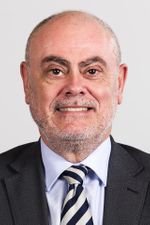
The Fundació Puigvert is working with the Faculty of Medicine through its general manager, Ramon Massaguer, who is a trustee of the Foundation for Advanced Health Sciences Studies. At the Fundació Puigvert, we believe that actively participating in the Faculty of Medicine of the UVic-UCC as trustees is an opportunity to contribute to a powerful university project, which is of strategic importance for Catalonia and has a major impact in Spain and internationally. The Fundació Puigvert was receptive to the invitation to join the project from the outset. We are a university hospital that is renowned in Spain and internationally in the fields of healthcare, teaching and research in the specialist field of urology, nephrology, andrology and assisted human reproduction. We believe that in these knowledge areas, with our capital of professional excellence, we can make a decisive contribution to contributing that excellence to the teaching provided at the Faculty of Medicine. We are aware of the colossal challenge involved in achieving these levels of university excellence, but we believe that we are heading in the right direction. In short, students and society in general will have to value the return that we provide, in terms of professionals that are comprehensively and extraordinarily well trained."
What are the outstanding characteristics of the Faculty of Medicine for its students?
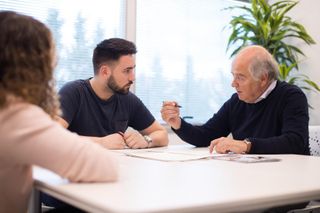
Dr Ramon Pujol, Dean of the Faculty of Medicine at the UVic-UCC, says that "patient-centred medicine, one of the core areas of teaching at the faculty, is not a new principle, but it must be sensitive to every social situation, and medical practice must be adapted because our patients, as individuals and as members of a community, have changed drastically in recent years. A great deal of our medical professionalism content deals with this area."
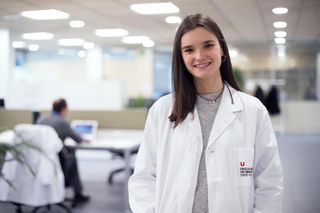
According to the student Mireia Cantó, this approach is a great opportunity: "some of the outstanding features of the Faculty of Medicine are the personal contact, personalisation and the tutoring. They all help us to maintain a close relationship with the lecturers and other professionals at the University. Another outstanding characteristic is the innovative case-based curriculum, which is based on clinical cases, and helps us to think about what working in the future will be like."
According to Pujol, "comprehensive and collaborative medicine, another important area, deals on the one hand with the aim of training students within a holistic model that will prepare them for subsequent specialised training, and on the other, teachers from different disciplines being able to work on collaborative basis with teams with which they share objectives."
Technological innovation in students' training must be a priority, and it means that teaching staff who are not highly trained are forced to work hard
Innovation in medical education is related to the desire to use innovative teaching methods, which are more able to foster student-friendly learning and contribute to the development of assessment tools which have an impact on training. "Technological innovation in students' training must be a priority, and it means that teaching staff who are not highly trained in this respect are forced to work hard," concludes Pujol.
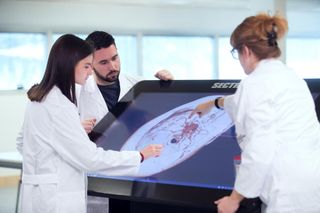
The student Àlex Boada believes that "the Faculty's teaching methodology allows you to explore new avenues in education, which are based mainly on encouraging independent learning. Clinical case-based learning means we can work with patients and medical data, it fosters work in small teams (which is how we will have to work professionally, in multidisciplinary teams) and encourages curiosity about finding out about the areas covered in class in detail. Other aspects of teaching, such as technological innovation (especially the SECTRA table) and specific simulations provide a clinical and practical perspective that complements the theory we work on in the classes."
"Research and knowledge transfer are intrinsic tasks of universities, regardless of their size. Generating new knowledge enables society to move towards the future, and faculties of medicine must help meet this need."
Strategic partnerships between UVic-UCC research groups and/or chairs and inter-university collaboration are essential factors. According to Pujol, "internationalisation at all levels is an open window that means we can incorporate new perspectives from foreign students and teaching staff and provide opportunities for our students who want to join other university teaching and research environments."
Distinguishing features in professional development
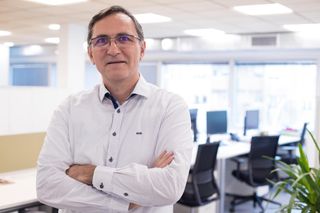
Dr Roberto Elosua, the senior lecturer at the Faculty of Medicine and the coordinator of the Epidemiology and Cardiovascular Genetics Research Group at the Hospital del Mar in Barcelona, believes that "the aim of the Faculty of Medicine, as well as the other faculties in this specialist field, is for students to acquire the knowledge and skills necessary to work professionally in medicine. But the UVic-UCC includes some important distinguishing features," he says.
The training is centred on the student, which implies a personalised learning, but above all means that the student is the primary person responsible for their learning
The primary consideration is that the training is centred on the student, which implies personalised learning, but above all means that the student is the primary person responsible for their learning, accompanied by their classmates and lecturers." To achieve this, he explains that "the faculty uses different innovative pedagogical methodologies with a core that is focused on learning based on clinical cases. Students work individually and with a small group of colleagues to acquire the knowledge needed to deal with a real clinical situation, and the competences to work in a group. Other methodologies are also used, such as lectures, practical work in small groups in workshop and laboratory formats, and simulations are included as a safe environment for transferring the knowledge and skills that are acquired."
"The second aspect is the comprehensive training, which includes not only knowledge, but also the skills and competences that are essential for practising of medicine, such as communication, relationship and empathy with patients, and ethical aspects, as well as community and population issues in health."
"As far as my involvement is concerned, the challenge of building a subject from the beginning, incorporating the various teaching methodologies, and focusing on promoting research and critical analysis of information was very exciting and enlightening. In that respect, the challenge for the University and the Faculty of Medicine is to foster research, not just among the teaching staff, but also among the students," concludes Elosua.